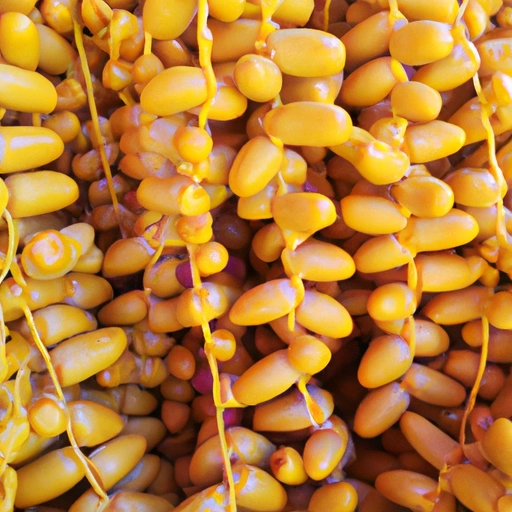Date
Description

Dates are the sweet, chewy fruits of the date palm tree (Phoenix dactylifera). They have been a staple food in the Middle East for thousands of years and are enjoyed worldwide for their rich sweetness and nutritional benefits. Dates are typically oblong in shape, ranging in color from bright red to bright yellow, and are often categorized as soft, semi-soft, or dry, based on their glucose, fructose, and sucrose content.
Common uses
Dates are frequently consumed as is, but they are also used as a natural sweetener in various recipes. They are a common ingredient in Middle Eastern and Mediterranean cuisine, and their use has spread globally. From being chopped and added to cereals and baked goods to being processed into syrups, spreads, and date sugar, their versatility in culinary applications is vast.
Nutritional value
Calories
A 3.5-ounce (100-gram) serving of dates provides approximately 277 calories, mainly from carbohydrates.
Protein
Despite not being protein-rich, a same-sized serving contains about 1.8 grams of protein.
Fat
Dates contain a negligible amount of fat, with a 100-gram serving having roughly 0.15 grams.
Carbohydrates
Most of the calories in dates come from carbohydrates, with 75 grams per 100-gram serving, of which 66 grams are sugars.
Vitamins
Dates are a good source of vitamins, particularly B vitamins such as B6, niacin, and pantothenic acid.
Minerals
They are also rich in essential minerals like potassium, magnesium, copper, manganese, and iron.
Health benefits
Dates are associated with numerous health benefits, including promoting digestive health due to their fiber content, aiding in blood sugar control due to their low glycemic index, and contributing to bone health with their mineral content. Additionally, they are loaded with antioxidants, which help in fighting oxidative stress.
Potential risks
Despite their health benefits, dates are high in calories and sugars, which may contribute to weight gain and dental issues if consumed in excess. Those with fructose intolerance should also moderate their date intake.
Common recipes
Dates are used in a variety of recipes from sweet to savory. They are key ingredients in traditional dishes like Maamoul, date bars, and various tagines. Dates are also popular in energy balls, smoothies, and as stuffing in meats.
Cooking methods
Dates can be eaten fresh or dried and are often used in baking and cooking. They can also be pureed to make date paste, which is used as a sweetener in recipes.
Pairing with other ingredients
Dates pair well with a range of ingredients including nuts, cheese, bacon, dark chocolate, and spices like cinnamon and cardamom.
Summary
In summary, dates are a nutrient-dense fruit with a rich history and versatile culinary uses. They offer numerous health benefits but should be consumed in moderation due to their high sugar content. Dates are easily integrated into a variety of dishes and can be enjoyed in both sweet and savory contexts, making them a beloved ingredient around the world.